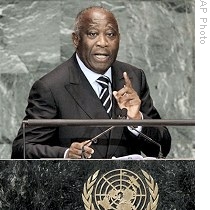Dakar
07 October 2009
Ivory Coast's electoral commission has officially delivered the provisional voter list to President Laurent Gbagbo, bringing the country a step closer to its long-delayed presidential elections, now scheduled for November.
 |
| Ivory Coast President Laurent Gbagbo, addresses the 64th session of UN General Assembly, (File Photo - 25 Sep 2009) |
The vote, which has been postponed several times since 2005, is an attempt to find a lasting political solution to nearly a decade of internal conflict in the once stable West African nation. When the country missed August and September deadlines for publishing the provisional voter list, many feared those setbacks would once again delay the vote.
But as he accepted the provisional voter database this week, President Gbagbo remained determined and optimistic, though he did not insist, as he has in the past, on a November 29 poll date.
The president says the elections must take place at least in 2009. He says the country must move forward, and the elections must happen this year. It can be done, he says, and it should be done for the good of Ivory Coast and West Africa. He says we should do it and we are going to do it. He says we are moving forward slowly and with care. It is like walking on eggs without breaking them, he says, but that is what is necessary and that is what they will continue to do.
Political parties now have a period of at least 30 days to review the provisional voter list, which will have to be agreed upon before ballots are printed. Candidates and observers have said that limiting the length of this review period will be essential to getting the elections back on track for November.
The list contains more than 6.3 million voters, of which more than 40 percent have been verified against the electoral list from 2000. It also includes the names of more than 900,000 new Ivorian voters, almost 50,000 foreigners and another 2.7 million voters not found in historical lists, according to Ivorian and private French technical operators.
Voter registration issues, particularly issues of nationality and voter eligibility, have prompted Ivory Coast to push back the election several times since President Gbagbo's mandate ran out in October 2005.
Civil war cut the nation in half in 2002, after rebels attempting to overthrow President Gbagbo took control of the northern part of the country. Thousands were killed in the conflict, and the country, though now at peace, remains tense and fractured. The country has since missed deadlines for presidential elections set by 2007 and 2008 peace accords that created a transitional, power-sharing government.
Issues of nationality were divisive during the crisis and remain sensitive. Though processing registration data for the country's some 6.5 million identified voters proved time-consuming, government officials have emphasized that confirming the validity of voter applications is essential to ensuring the success of the election.
U.N. special envoy to Ivory Coast, Young-Jin Choi, says that though these technical delays are "not encouraging," too much progress has been made to get discouraged now. He says the publication of the provisional list marks the end of a lengthy data processing period, and there is now a "very strong electoral momentum" that will be difficult to break.
"The processing itself is over now, so that means there are progresses every day, every week. The election is just around the corner," said Young-Jin Choi. "You can even feel it."
Yet, the publication and approval of the voter list, though a crucial step, is not the only obstacle remaining. The disarmament of the country's former rebel factions, set to be completed before the vote, is also behind schedule.
Though election officials are still working toward a November 29 poll, observers fear there is still too much work to be done and scrambling to make the deadline could result in a flawed vote.